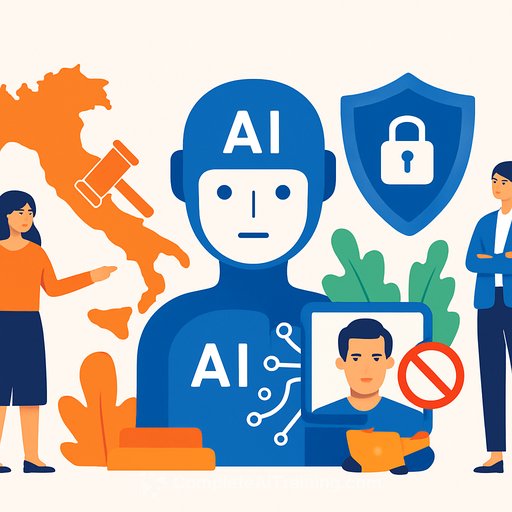Italy Passes Comprehensive AI Law: Compliance Priorities for Legal Teams
On 22 September 2025, Italy enacted a comprehensive law to regulate artificial intelligence. The statute places human interests, transparency, and security at the center and moves national AI governance to a practical, enforceable stage.
For in-house counsel and compliance leaders, this is a clear signal: AI use across employment, healthcare, and education now sits within defined legal guardrails. Enforcement, liability, and cybersecurity oversight are all tightened.
Core pillars of the law
- Human-first and transparent use: Systems and processes must protect individuals and explain how AI is used.
- Security and oversight: Continuous cybersecurity monitoring and market supervision are mandated.
- Strict liability for AI-enabled fraud and deepfakes: Certain offenses carry prison terms from one to five years.
- Protection of minors: Platforms require parental consent for users under 14.
Where it applies
- Labor market: Clear rules govern AI in hiring, performance tracking, and workplace decision-making.
- Medicine: Use in clinical support and patient-facing tools must follow defined standards.
- Education: Deployment in classrooms and assessment tools must comply with explicit requirements, including age gating.
- Public sector: Government agencies face strengthened accountability in AI adoption and oversight.
Enforcement and penalties
- Criminal exposure: Deepfake and AI-driven fraud can trigger imprisonment from one to five years in specified scenarios.
- Regulatory powers: Authorities have defined mandates for supervision and penalties.
- Cybersecurity obligations: Consistent monitoring and incident readiness are expected across AI deployments.
Innovation and funding
The law pairs enforcement with investment support. Venture funding is opened for startups and telecom projects to accelerate compliant innovation.
Experts view this as a shift from principles to execution with written timelines and penalty norms. Critics question whether the current investment volume is enough for global competition, but the law's risk-benefit balance is set.
Immediate actions for legal and compliance teams
- Inventory and classify AI use: Map systems across HR, clinical, educational, and public-facing workflows. Note models, data sources, and decision points.
- Deepfake and fraud controls: Implement provenance checks, watermarking where feasible, detection tools, and a takedown/escalation process.
- Child access governance: Enforce age verification and parental consent for under-14 users; document verification and retention policies.
- Transparency artifacts: Prepare clear user notices, model usage disclosures, and records of human oversight.
- Cybersecurity baselines: Conduct threat modeling for AI systems, establish monitoring, and test incident response for model misuse.
- Vendor risk: Update contracts for audit rights, security commitments, misuse reporting, and indemnities tied to AI outputs.
- Employment policy updates: Define acceptable AI use, human-in-the-loop requirements, and documentation for employment decisions.
- Training and audits: Train staff on fraud risks and minor protections; schedule periodic audits and keep evidence logs.
Risk areas to prioritize
- Identity and content integrity: Deepfakes, impersonation, and synthetic media disclosures.
- Automated decisions: Bias, explainability, and human review in HR, healthcare, and education.
- Data provenance: Lawful sources, consent records, and retention tied to use cases.
- Third-party models: Downstream liability from embedded or API-provided AI services.
Context and further reading
Reporting indicates Italy's approach operationalizes European-level AI policy with defined timelines and penalties. For background on regional frameworks, see the European Commission's page on the AI Act and broader reporting on AI policy.
Optional resources for team upskilling
If your organization is building internal AI literacy for compliance and policy teams, curated training can help standardize practices across HR, IT, and legal.
The bottom line: Italy's statute brings clear expectations to how AI is built and used-especially where people can be harmed or misled. Align governance now, document it well, and be ready to show your work.
Your membership also unlocks:






